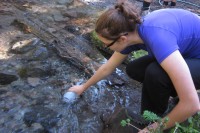By Emily Goodwin, Water Quality Assistant of Columbia Riverkeeper and Audra Cody, Volunteer Coordinator Intern of Cascade Mountain School
Cascade Mountain School (CMS) is an outdoor summer science school running residential programs for middle and high school students in the Columbia River Gorge. CMS gives students the opportunity to apply scientific and mathematical learning to real-world issues. CMS is a project of the Mt. Adams Institute, a 501c3 non-profit organization working throughout the Columbia River Gorge with offices in Hood River, Oregon and Trout Lake, Washington. Students can earn high school science and college credit for CMS courses.

During the 13-day Sustainable Agriculture Course in late June, high school students worked and played in the beautiful organic valley of Trout Lake, Washington. At this intensive residential science camp students lived on a small organic farm and spent their days and evenings farming, cooking, biking, and studying local and global food systems. The course readings included Michael Pollan’s The Omnivore’s Dilemma and other articles about sustainable farming. Each student completed at least seventy-five academic hours and fifteen hours of service. The course culminated in a student-led inquiry project based on a real-world agricultural issue in Trout Lake.
This summer students tackled the very real-world issue of water quality throughout the Trout Lake valley. There has been a history of water quality issues, primarily with high bacteria counts, along the 100+ year-old open irrigation ditch system. Downstream users in the valley need clean irrigation water for their fields. The Trout Lake ditches pull water from and release water back into the White Salmon River, an important river for recreation and salmon.
Currently there is a proposed solution in the valley of piping the irrigation water which would ensure water quality, create a pressurized irrigation system, and offer a potential for hydropower. However, this option is costly and removes some of the aesthethic and wildlife benefits of the current open ditch system. Students were assigned the task of using data collected from local sources, gathering information independently, and talking with landowners and farmers to respectfully generate alternative solutions to the proposed pipe option. CMS students took a systems perspective of the problem and came up with a solution that focused on exclusion fences, bioremediation, native species riparian zones, and improved water crossings for livestock throughout the valley. Their final presentation to the landowners, community members, and natural resource management professionals included an ecological understanding of the issue, pragmatic solutions, cost estimates, and funding considerations. Most remarkably, they generated a very creative community-based solution to address the labor and cost aspects of the project.
The course ended with the presentation as well as a bountiful harvest lunch for the families and community members. CMS students prepared and served the homemade meal in the barn that served as our classroom, our kitchen, our theater, our game room, and our home for the two weeks. The meal was created out of ingredients we had harvested or made throughout the course such as homemade ricotta, roasted chicken, fresh fruits and vegetables. CMS is proud of the work of the students and looks forward to working with the community of Trout Lake again.
CMS worked with the following partners during the Sustainable Agriculture Course:
Mt. Adams Institute
Columbia Riverkeeper
Underwood Conservation District
Gorge Grown Food Network
Broadfork Farm
Trout Lake Farm
Trout Lake Abbey
Sunnybrook Farm
The Pearson’s Dairy
The Heard Farm
The North Land of Milk and Honey
The Trout Lake School District
Columbia Gorge Community College
Klickitat County Health Department
Glacier Spring Water Company
And a number of individuals.


